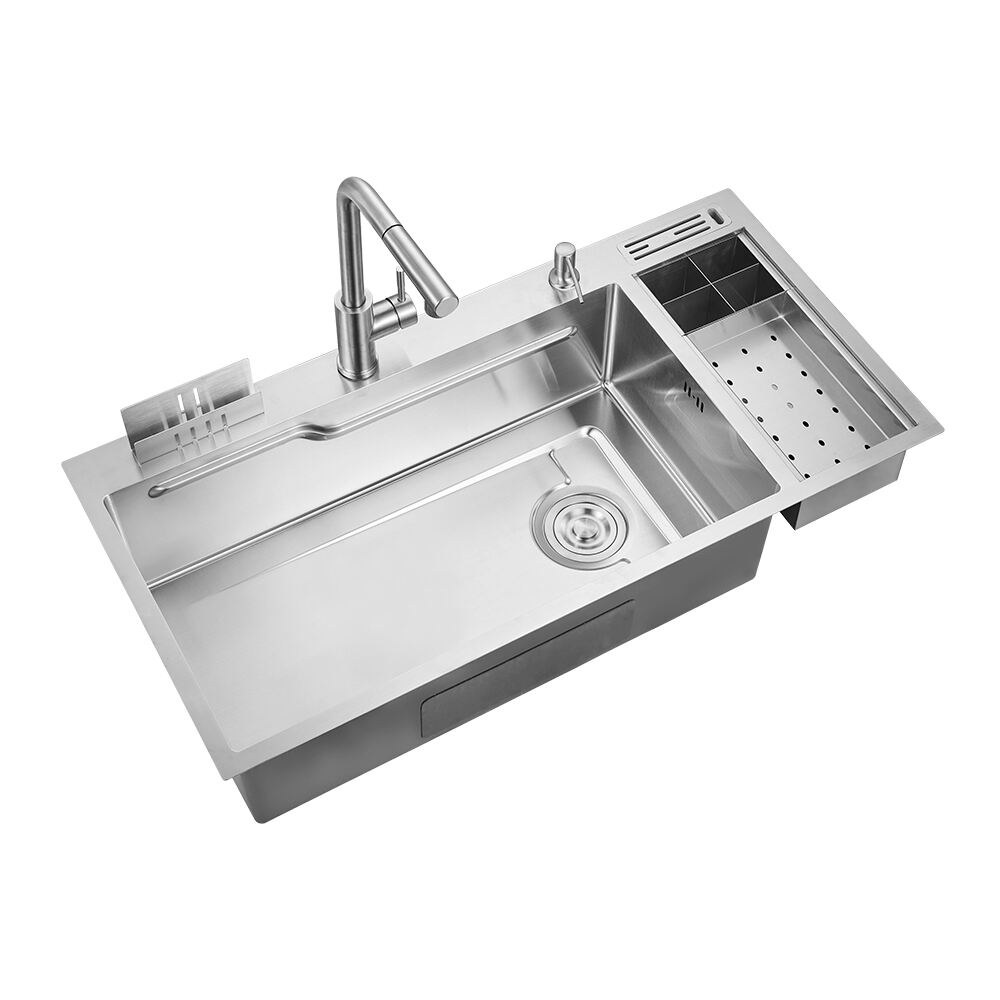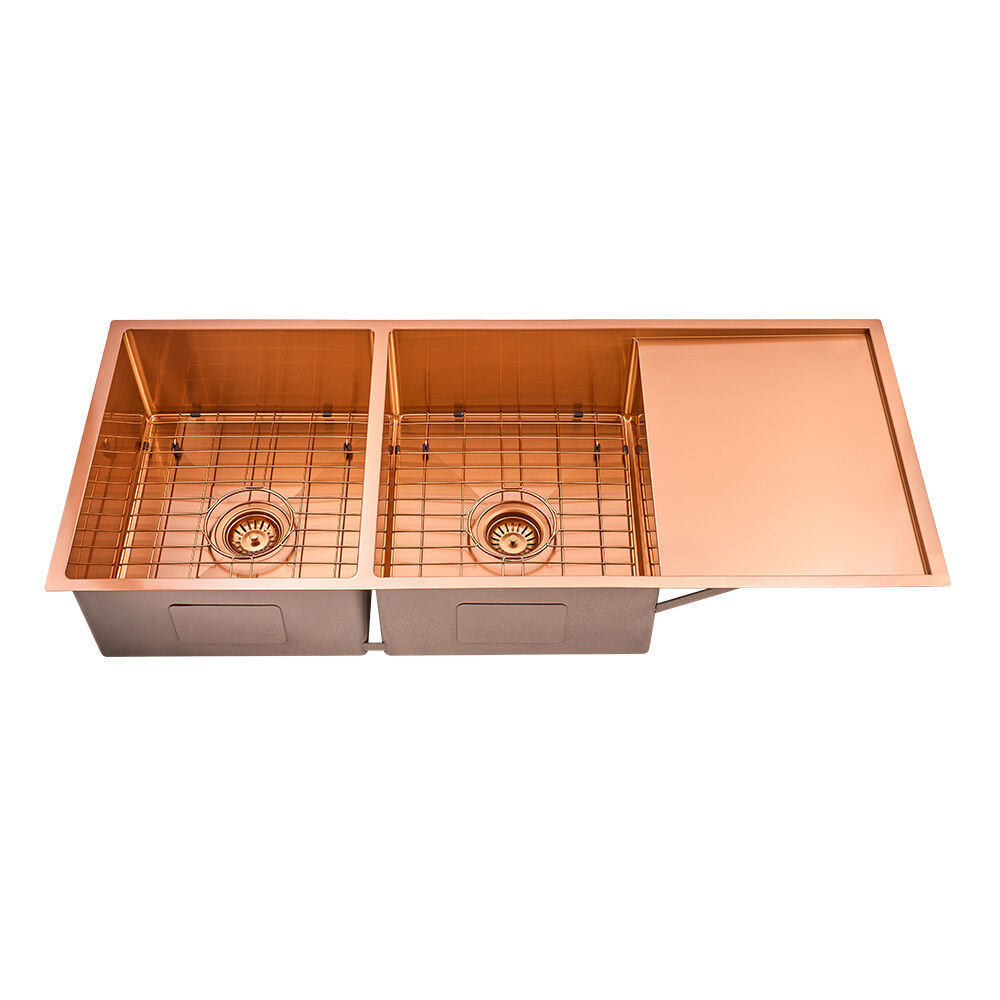התפקיד של תוספות קיימות במטבח קומרציאלי
בכל סביבת מטבח קומרציאלי, קיימנות והיגיינה הן שתי היבטים חיוניים בבחירת תוספות. מהשולחנות להכנה ועד לתחנות שטיפה, כל חתיכת ציוד חייבת לא רק להיות חזקה דיו כדי לעמוד בשימוש יומיומי כבד, אלא גם לתרום לעמידה בתקני ביטחון המזון וליעילות תפעולית. לכן, כיור סטainless steel הפך לבחירה פופולרית כל כך בקרב שפים, בעלי מסעדות, מתקני עיבוד מזון ומטבחים מוסדיים. בשונה מחומרים אחרים שעלולים להסתrack, להזדהר או לאגור חיידקים עם הזמן, הכיור מפליז אל חלוד מציע קיימנות אולטימטיבית, עמידות בתחל corrosion וקלות באחזקה. תכונות אלו הן קריטיות בסביבות richadashtot שבהן זמן, ניקיון ואריכות שנים הן חלק מהמתכון להצלחה. הכיור המבוצר היטב אינו משרת רק תפקיד פונקציונלי; הוא תומך בזרימה הכוללת של העבודה, מקטין את הסיכוי לזיהום ויצירת מראה מקצועי ושטוח שמשפר את המראה הוויזואלי של המטבח. ככל שנעמיק בפירות המדויקות, יתבהר למה סוג זה של הכיור נשאר הסטנדרט במרחבים מסחריים.
חוזק החומר וקיימותו
נבנה כדי לעמוד בשימוש כבד
אחת הסיבות המרשימות ביותר לבחור הכיור משטainless Steel עבור מטבח מסחרי היא היכולת שלו לעמוד בשימוש כבד לאורך זמן ללא נזקים. ה изготовлен מسبائك פליז ממדרגה גבוהה, הם עמידים בפני חריצות, סדקים ועיוותים שגרם להם שינויי טמפרטורה פתאומיים או פגיעות חזקות. בрестורנים ובuffed משמשים את הכיורים כמעט כל הזמן למשימות מגוונות, החל מרחיצת ירקות ועד ניקוי סירים גדולים וכלי עבודה. הכיור משטainless Steel שומר על המבנה והביצועים שלו גם תחת עומס מתמיד זה, מה שהופך אותו לאמין בהרבה לפנים חלופות הפוצלן או האקריליק. עוצמתו הפנימית של החומר מאפשרת גם בנייה דקה יותר מבלי להקריב את העמידות, מה שיכול לעזור למקסם את שטח העבודה במטבח קטן.
עמידות בפני קורוזיה וחלודה
עוד מרכיב חשוב של הכיור מפליז הוא ההתנגדות המצוינת שלו לאיחוי. במטבחים נוטים להשתמש במשחות ניקוי, מזונות חומציים ומים רותחים שעלולים לפגוע בחומרים אחרים לאורך זמן. הפליז, ובפרט דרגות כמו 304 ו-316, מכיל כרומיום וניקל שיוצרים שכבה הגנתית המונעת את היווצרות השחפת. הדבר הזה הופך את הכיור למתאים לא רק לשטיפת כלים רגילה אלא גם לחשיפה למוצרי מזון, חומרים נקיים ואפילו חומרים קלים בוערים. ההתנגדות הזו מבטיחה חיים ארכים של שירות, מפחיתה את הצורך בהחלפות תכופות וחותכת את עלויות התפעול לטווח רחוק. בבחירת הכיור מפליז, מתקנים מסחריים יכולים להינות מיעילות תפעולית וכמו גם מיתוג חזרה על ההשקעה.

היגיינה וסניטציה
משטח בלתי חדיר מונע הצטברות של חיידקים
איגוד הוא אחת ההעדפות המובילות בהכנה מסחרית של מזון, ו הכי חשוב, אגן הפליז מספק משטח היגייני שאינו נקבובי באופן טבעי. בשונה מאגני עץ או חרס, פליז אינו סופג נוזלים, ריחות או שאריות מזון, מה שעוזר לנקות ולצנן אותו בקלות רבה יותר. תכונה זו עוזרת למנוע את התרבותם של חיידקים ועוגת, שתיהן יכולות לפגוע בבטחון המזון ולהוביל לחריגים של קוד הבריאות. ניקוי שגרתי במים חמימים ובסבון קלוש מספיק בדרך כלל כדי לשמור על רמת ניקיון גבוהה, ומאפשר למטבחים עמוסים לעמוד בתקני היגיינה קפדניים עם מאמץ מינימלי.
תחזוקה וניקוי קלים
כיורים מפליז נержשת נוחים מאוד לניקוי ולתחזוקה, הודות לפני השטח חלקים ולעמידותם בפני כתמים. בניגוד לחומרים שדורשים טיפול מיוחד או ידידותיות בהפצה, פליז נержשת ניתן לנקות במהירות באמצעות אמצעי ניקוי בסיסיים, גם לאחר חשיפה לשמן, שמנוני או שאריות חומציות. לכן, צוותי הניקיון יכולים להתמקד יותר במהירות וביעילות ולא לדאוג לפגוע בתקן. בנוסף, כל שטיח שנוצר לאורך הזמן נוטה להתמזג עם גרגר המתכת, במקום להיות תופס כפגם. תכונה זו של היציר השמירה על מראה נקי ומקצועי, גם עם בלאי יומיומי.
פונקציונליות וגמישות בעיצוב
התאמה למספר רב של תצורות
כיור סטנلس סטיל ניתן להתאמה כדי לעמוד בדרישות הספציפיות של סביבות מסחריות שונות, כולל משאיות אוכל, אופקים בתי ספר, בתי חולים ובתי אופ Bakery. הם מגיעים בפורמטים של אגן בודד, כפול או משולש, וניתן לבנות אותם עם תכונות נוספות כמו מדיחים, מדפים תחתונים או מגני ניצוץ. גמישות זו מבטיחה כי כיור לא ישמש רק כתחנת ניקוי, אלא גם כמרכיב זריזות בתהליך העבודה שמזער תנועה ושעורי עבודה מיותרים. כאשר מתכננים נכון, הקונפיגורציה הנכונה של כיור סטנלס סטיל יכולה לשפר משמעותית את היעילות במטבח על ידי קידום ביצוע משימות מרובות ושמירה על חלוקה ברורה בין אזורי ההכנה, הכביסה והשטיפה.
שילוב חלק בתוך אזורי עבודה
יתרון חשוב נוסף של הכיורים מפליז הוא היכולת להשתלב באופן חלק עם משטחי עבודה ומדפים מפליז. אחידות זו לא רק שמשפרת את המראה האסתטי של אזור העבודה, אלא גם יוצרת פחות מפרקים ופערים בהם עשן או לחות עלולים להצטבר. במטבחים עם נפח עבודה גבוה, בהם ניקיון ועקביות מראה היא בעלת חשיבות מכריעה, תכנון חלק תורם לסביבת עבודה נקייה יותר ולניקוי מהיר יותר. בנוסף, המראה המודרני וה תעשייתי של הפליז מעניק למטבח תחושה מקצועית, אשר לרוב מתקבלת בברכה על ידי הצוות, הלקוחות והinspectors בריאות alike.
יעילות כלכלית וערך לאורך זמן
עלויות תחזוקה נמוכות לאורך זמן
למרות שהשקעת ההתחלה של הכיור מפליז עלולה להיות גבוהה במעט בהשוואה לחלופות אחרות, החיסכון בטווח הארוך עשוי להיות משמעותי. החומר הבלתי ניתן לשבירה מבטיח פחות תיקונים, החלפות ופערים בהפעלת המטבח לאורך זמן. מאחר שפליז אינו נאכלת שפיר, אינה נשברת ואף עמידה בחום, אין כמעט צורך בטיפולים יקרים או שכבות הגנה. בנוסף, ניקיון פשוט וקל משפר את יעילות העבודה ומחמיס על עלויות כוח אדם. לאורך חיי השימוש בכיור, כל הגורמים הללו משתלבים ויוצרים ערך משמעותי, מה שהופך אותו להשקעה חכמה עבור כל מטבח מסחרי.
חומרנית וידידותית לסביבה
קיימות דאגות גוברות בקרב מטבחים מסחריים רבים, והפליז אינו מזוהה עם ערכים אקולוגיים. רוב הכיורים מופצים ממתכת מחזורית באחוזים גבוהים, וכן ניתן למחזר אותם באופן מלא בסוף תקופת השימוש שלהם. מכאן נגזר כי הם אופציה מצוינת למסעדות, ספקי מזון ויצרני מזון המעוניינים להפחית את ההשפעה הסביבתית שלהם מבלי להתפשר על האיכות. בחירת פליז עוזרת לארגונים להסתגל לאתרי איכות ירוקה, עידוד של הרשויות ו העדפות הצרכנים, תוך שמירה על הביצועים הדרושים.
התאמה לסטנדרטים וקודים תעשייתיים
הסכמה עם תקנות בטיחות מזון
מטבחים מסחריים נתונים לתקנות ביטחון חמורות, ולכן חשוב לבחור ציוד שיסייע בשמירה על עמידה בדרישות. הכיורים מפליז נержשת עונים על תקנות הבריאות של המחלקות המוסמכות, לרבות התקנות של יס״ב (המוסד לאיגוד בריאות לאומי). הפשטות בבירור, ההתנגדות לחיידקים והמשטח שאינו מגיב הופכים אותם למוכרים ליצירת מגע ישיר עם מזון. בחירת הכיור הנכון עשויה להקל על הצלחה בבדיקות ובאודיטים שגרתיים, וכך להפחית את הסיכון לקנסות או לסגירה. עמידה בדרישות אלה נותנת למשתמשים תחושת ביטחון ומאפשרת להם להקדיש את תשומת הלב למכוני המזון ולחברה.
מותאם למספר סביבות מסחריות
הכיות סטנלה אינן מוגבלות למסעדות וקפיטריות - הן בשימוש נרחב במעבדות, מפעלים תעשייתיים, מטבחים במלונות ואפילו בבתי ספר. גיוון זה הוא עדות להתאמה שלהן וליתרון הביצועים הרחב שלהן. בכל סביבה, אותן תכונות - קיימות, היגיינה, גמישות ואסתטיקה - נותרות חשובות. בין אם הן משמשות למטרות ניקוי מזון, חומרים כימיים או ציוד, הכיות הסטנלה ממשיכות להוכיח את ערכן בענפים רבים, מה שהופך אותן לבחירה חכמה לכל התקנה מסחרית.
שאלות נפוצות
איזה סטנלה משמשת הכיות מסחריות?
לרוב היישומים המסחריים, סטנלה במשקל 16 או 18 היא אידיאלית. היא מציעה איזון בין קיימות, נגישות כלכלית ועמידות מספקת לשימוש כבד יומיומי.
איך אני שומר על הברק של הכיית הסטנלה שלי?
ניקוי שגרתי בסבון קל ומים הוא לרוב מספיק. לצורך בراق נוסף, ניתן להשתמש בפתרת חומץ או בניקוי סטנלה, ואז לנקות בבד רך.
האם הכיות פליז משמיעות רעש?
כפיות פליז מודרניות תומכות לרוב במטות בלימת רעש או בפיגומים תחתוניים שנועדו להפחית את הרעש שנוצר מהמים הזורמים ומהכלי מטבח שנופלים פנימה.
האם ניתן להתאים את הכיות הפליז לסידור המטבח הספציפי שלי?
כן, יצרנים רבים מציעים אפשרויות התאמה מותאמות אישית, הכוללות גודל הכייה, מספר התאים, וכן גם אביזרים כגון מדיחים ומדפים שמתאימים לצרכים הספציפיים שלך. הצרכים שלי.



